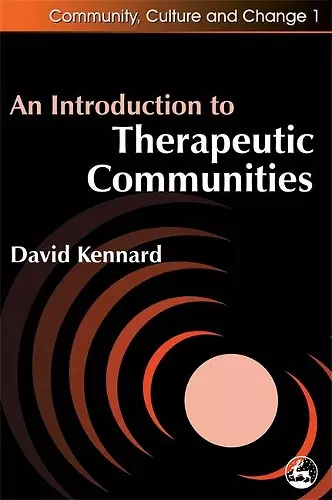An Introduction to Therapeutic Communities
Format:Paperback
Publisher:Jessica Kingsley Publishers
Published:1st Jul '98
Currently unavailable, and unfortunately no date known when it will be back

Therapeutic communities provide, in addition to safe accommodation and twenty-four hour care, a highly structured environment with set rules and timetables. Within this environment they establish a set of relationships and meetings that provides a safe emotional container for distress. Members play an active role in all decisions affecting them, which can include voting on the admission and discharge of other residents, allocating daily domestic tasks to all members of the community, and holding members accountable for the breaking of rules. The range of institutions included in the term 'therapeutic communities' means that each community is unique and adapted to the particular needs of its residents.
This comprehensive introduction to the nature and work of such communities sets them within their historical and social context, looking in detail at the influence of leaders in the field, such as Maxwell Jones, to create a backdrop against which current practice can be viewed. The author examines communities specifically aimed at certain sectors of society, including drug abusers, offenders, those with a diagnosed mental illness and people with a severe personality disorder. The second part of the book describes the day-to-day running of a therapeutic community and the responsibilities, rewards and anxieties experienced by members of staff.
Reviewed with Therapeutic Communities: Past, Present and Future by Penelope Campling and Rex Haigh
'The book is thoughtfully written, covering the arguments which have been put for and against therapeutic communities (do they liberate their clients or brainwash them?) and detailing core concepts and practices. Some therapeutic community variations are explained, especially the major differences between the democratic model, used mainly for personality disorder, and the concept-based model, aimed at drug abusers. The first edition has become an authoritative text, widely cited and accessible to lay and professional readers alike; this version looks set to continue that role.'
The strength of his account is its honesty and the relevance of this approach to multi-agency and de-institutionalised mental health services. -- Community Care
Kennard discusses the key issues of therapeutic communities and applies them to everyday situations: not just to the psychiatric arena, but to management, social life and general health care. The book's major strength lies in its succinct illustration of the critical importance of the interplay between the individual and the wider community. It does not have that evangelical quality of some texts; Rather, this is a rational, objective analysis of psychiatric intervention using therapeutic communities as a focus. Enlightening for those new to psychiatry, I would recommend it to experienced mental health workers too. -- Mental Health
ISBN: 9781853026034
Dimensions: 234mm x 156mm x 10mm
Weight: 300g
192 pages